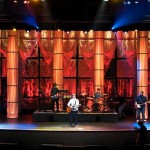Let’s all stand and worship the Lord together…
If you follow me on Twitter (@alan_knox) or if you “like” my Facebook page, then you know that I link to several older posts each day along with linking to my new post of the day. I started linking to this older posts a couple of years ago in order to continue the conversations on those posts, and it has worked tremendously!
For example, yesterday I linked to a post I wrote two years ago called “Why keep the worship service?” Believe it or not, my thoughts about the church began to change drastically when I began to study the “worship service” from the perspective of Scripture. In short, I couldn’t find it. Instead, I found believers gathering in completely different ways from the “worship service.”
In response to that link yesterday, Doug from “With your Latte” (a great blog name, by the way) left a comment on my older post and wrote a post of his own called “Why a Worship Service?”
In part of that post, Doug writes:
I have questioned the worship service many times myself and have asked others about it. The question of doing away with the worship service is normally met with a look of puzzlement. The idea of not having “church,” in the tradition sense, is just too far of a reach – its a foreign concept to be embraced only by the poor and/or persecuted. Besides, where would the clergy find employment? – (that was some of the cynicism i mentioned)
Before you brush off this question, ask yourself where in Scripture we find a description even remotely similar to the modern “worship service.” For something so important that it defines most church groups today, you would think it would be found somewhere in the New Testament at least… in one of the passages that discusses believers gathering together. But, no.
A few years ago, I made an interesting discovery. During the “Reformation,” Martin Luther took the Roman Catholic Mass and modified it slightly and called it “Divine Service” (i.e., “worship service”). This is the pattern that most Protestant (non-Catholic, non-Orthodox) church groups follow today – both “traditional” and “contemporary.” Oh, sure, there may be differences here and there, but for the most part, it’s the same.
But, guess what? Luther designed this “worship service” for unbelievers, not for the church. Luther did not believe that “true believers” should meet in this way. He had a different kind of gathering in mind for Christians, but he could not find anyone interested in this other kind of meeting. In other words, Luther was suggesting something very similar to how “house”, “organic”, “simple” churches gather today. (For more information about Luther’s different kinds of “divine service” see my posts “Luther and the non-Christian ‘worship service’” and “Luther and the Church.”)
So, I’ll ask the same question that I asked in that earlier post: Why keep the “worship service” for the church?
Replay: All Day Worship Service
Six year ago, I write a post called “All Day Worship Service.” In the post, I wrote about a day – that also happened to be a Saturday – that we spent with the church – all day – with different brothers and sisters doing different things throughout the day. But, the entire day was a day of worship and service. No, there was no preaching… no music, bands, or choir… no singing. But, it was definitely a day of worship service. At least, this is what I consider to be an all day worship service. What about you?
———————–
All Day Worship Service
The title of this post usually conjures up images of long meetings with teaching, singing, dinner on the grounds, etc. However, that is not the point of this post. Consider this passage:
As each has received a gift, use it to serve one another, as good stewards of God’s varied grace: whoever speaks, as one who speaks oracles of God; whoever serves, as one who serves by the strength that God supplies- in order that in everything God may be glorified through Jesus Christ. To him belong glory and dominion forever and ever. Amen. (1 Peter 4:10-11 ESV)
For some reason, God chose to give us several opportunities to serve Him through serving others last Saturday.
Saturday morning, we had the chance to video chat with some friends in another country. I’ve written about them before in the post “Praying with the Church“. They are still in a very dark place, and they have had some physical ailments lately. It was great to laugh with them, encourage them, wish the older daughter “Happy Birthday”, etc.
Saturday for lunch, I had the opportunity to eat with a couple of new friends – a father and his son. Again, we were able to discuss Scripture and God’s will and ministry while enjoying fellowship over a great meal of Mexican food.
Saturday afternoon, I met with another brother and his wife to again discuss Scripture and ministry. There was no meal this time, but the conversation was as nourishing (if not more so) than food would have been.
Saturday afternoon, my family helped another family with yard work. Truthfully, I did very little yard work. I arrived after most of the work had been done. This was a very encouraging time for me, because others had given up their Saturday to help as well. It is truly a beautiful sight to see brothers and sisters helping one another.
Saturday evening, we were able to share pizza and ice cream with another couple. These are very dear friends that we have known for several years. God has done a great work in all of our lives, and he keeps growing us closer to one another as he grows us closer to him.
In all, God allowed us to interact with nineteen brothers and sisters just on Saturday. No, there was no planned meeting or event. In fact, the lunch and afternoon meeting were not planned until Friday evening. The evening dinner was not planned until… well… Saturday evening. (We’re very spontaneous people.)
So, as I was thinking about these opporturnties to serve God by serving others, the passage from 1 Peter came to mind. I’m sorry to say that I did not think of this passage while we were talking and working with these brothers and sisters. But now that I think about it, I wonder… Did our words convey the truth of God? Were our actions carried out in order to serve by the power that God provides? If so, then we worshipped God.
I truly believe that this is the type of “worship” service that God desires. I pray that God allows my family – and others – many more opportunities to worship him by serving others.
Frame: The New Testament does not describe the early Christians as meeting for worship.
As I’m going through some of my research for my dissertation, I occasionally run across a quote that puzzles me. One of those is by the famous theologian and prolific writer John Frame. Frame often writes about worship, including the book Worship in Spirit and Truth which I include as part of the research for my dissertation. (By the way, for those who don’t know – and who care – the title of my dissertation is “Mutual Edification as the Purpose of the Assembled Church in the New Testament: A Study in Biblical Theology.”)
In his book, Frame comes to the same conclusion regarding the New Testament evidence as me. At one point, he writes:
Is the Christian meeting a “worship service”? Some have said no, on the ground that in the New Testament all of life is worship. It is true that the New Testament does not describe the early Christians as meeting for “worship.” Nor does the New Testament typically use the Old Testament language of sacrifice and priesthood to describe the Christian meeting as such. Much of the New Testament teaching about the meeting has a horizontal focus: the importance of showing love for one another in the meetings (1 Cor. 11–14), the importance of education (1 Cor. 14:26; Heb. 10:24–25). (pg 31)
Did you catch that? According to Frame, the authors of the New Testament do not use worship terminology to describe the times when believers gather together. They do not use the language of sacrifice or priesthood either, terminology often used in the Old Testament. Instead, again according to Frame, the authors of the New Testament – when writing about the assembled church – focused on “showing love for one another” and “the importance of edification.”
Yes, exactly. Again, that’s the same conclusion that I’ve reached through studying the New Testament.
Not only that, but Frame and I also agree when it comes to using “worship” terminology to refer to the gathering of the saints:
Traditionally, Christians have called it [the Christian meeting] ‘worship,’ having in mind a sense of the term that is analogous to its use in the temple setting. This use of the worship vocabulary is somewhat dangerous, for it may lead us to forget the vast differences that exist between Old Testament worship and the New Testament meeting. (pg 32)
Did you catch that also? Frame says that it’s dangerous for Christians to use “worship” terminology to refer to the times that we gather with our brothers and sisters in Christ. Why? Because it confuses “the vast differences that exist between Old Testament worship and the New Testament meeting.”
Yes, exactly. Again, that’s the same conclusion that I’ve reached through studying the New Testament.
So, what’s the problem? Well, while we agree about the New Testament evidence concerning the church meeting, Frame and I do not come to the same conclusion regarding our application of this evidence.
He writes:
Therefore, it is not wrong to describe the Christian meeting as, in one sense, a worship service. To say this, however, is not to say that there is a sharp distinction between what we do in the meeting and what we do outside of it. (pg 34)
So, Frame concludes, “Go ahead and call it a ‘worship service’ and describe what you do as worship – even though the New Testament authors did not refer to the gathering of the saints in worship terminology and even though using worship terminology is dangerous and even though there is no distinction between our worship when we are together and our worship when we are not together.”
Honestly, it just doesn’t make sense to me.
The Call to Worship
While we’ve been studying through Ephesians on Sunday mornings, we keep tripping over the word walk. Of course, these instructions about “walking” are actually instructions about living. And, of course again, living is something that take place every day… every minute actually.
When you think about the way you “walk” (or live), do you only think about certain times or certain situations? Of course not. Life never stops. Our “walk” never stops. Whether we are walking in a worthy manner or not, we are always walking.
Just to get the juices flowing… here are the passages that I’m referring to:
And you were dead in the trespasses and sins in which you once walked, following the course of this world, following the prince of the power of the air, the spirit that is now at work in the sons of disobedience… (Ephesians 2:1-2 ESV)
For we are his workmanship, created in Christ Jesus for good works, which God prepared beforehand, that we should walk in them. (Ephesians 2:10 ESV)
I therefore, a prisoner for the Lord, urge you to walk in a manner worthy of the calling to which you have been called… (Ephesians 4:1 ESV)
Now this I say and testify in the Lord, that you must no longer walk as the Gentiles do, in the futility of their minds. (Ephesians 4:17 ESV)
Therefore be imitators of God, as beloved children. And walk in love, as Christ loved us and gave himself up for us, a fragrant offering and sacrifice to God. (Ephesians 5:1-2 ESV)
Walk as children of light (for the fruit of light is found in all that is good and right and true)… (Ephesians 5:8b-9 ESV)
Look carefully then how you walk, not as unwise but as wise, 16 making the best use of the time, because the days are evil. (Ephesians 5:15-16 ESV)
Now, when I was meditating on those passages, I came across the post below on Dave Black’s blog (November 24, 2012 at 8:52 a.m.):
“Now let us prepare our hearts for worship this morning” is perhaps the most-repeated sentence you’ll hear when you enter church on Sunday mornings. It is, of course, completely unbiblical. Worship is 24/7 (see Rom. 12:1-2). We don’t come to church to worship; we come as worshippers.
Theologically, the church has no “place of worship.” God already dwells within the community of His followers. A church building can never properly be called a “worship center” because that title has been reserved, under the New Covenant, for God’s people. For me, having a “call to worship” is a witness to a deep lack of biblical understanding. True worship, real biblical worship, takes place Monday through Saturday as much as it does on Sunday.
I wonder what would happen if Christians stopped seeing a certain time at a certain place as “worship” and understood that every step they took (in their “walk”) is or is not worship. It can be worship… it may not be worship.
I wonder what would happen if Christians began to realize that God is probably more concerned with how they live at other times than what they do when they enter a “church building” (or a home church, for that matter).
It’s about our walk… not about a special time of “worship.”
Replay: Sacred Times and Places
Five years ago, I wrote a post called “Sacred Times and Places.” The post was some thoughts that were inspired by an article written by another blogger. The question I’m considering is this: If God is everywhere at all times, then why do some people seem to sense (or hear) him more at certain times and certain places. Thinking through this question can help us help others.
———————————
Sacred Times and Places
Phil at “Square No More” recently posted a blog called “The Christians and the Pagans Meet for Samhain” as part of the Halloween synchroblog. He says:
Sacred spaces, and sacred times are not terribly important to me. One day is like any other, and one place like another. Some of you reading this will be appalled to hear that the Vatican is no more holy to me than a dumpster. Now this does not mean that I do not appreciate fine Cathedrals, or beautiful Abbeys and Chapels. Rather it means that I believe God can manifest His gracious presence anywhere He so chooses, and He is not impressed by places and times, but instead by humble human hearts…
Yet, human hearts often attach greater importance to one place, or time over another, and I believe that there is a God in this universe Who loves people so desperately that the Divine presence of love, grace, and power will appear to those who yearn for it. Sometimes that search for God in sacred times and spaces yields results not because God honors the place, but the yearning hearts which go there.
I believe that Phil is making a distinction that is very beneficial, and one that we should consider carefully. From Scripture, we know that God does not dwell in buildings and that God is not more present at certain times and days. Yet, we cannot neglect the fact that throughout history people have come into the presence of God in specific places on specific days at specific times. When these occurrences become regular (as in Sunday mornings, for example), it is easy to believe that this time (and certain places) are somehow more holy than others.
Since God’s presence is not limited to certain places and times, why do some people sense his presence or meet with him primarily at certain places and times? By Scripture, we know that this is not an indication of the limit of the presence or activity of God. Instead, as Phil points out in the quote above, finding God primarily at certain places and times is more of an indication of when and where people are actively seeking God.
Even though God is present in all locations, on all days, at all times, and in all situations, people are not always seeking God’s presence and they are not always listening to his voice. People are not always attempting to live by the Spirit of God, in spite of the fact that the Spirit of God is always present. Even those who are followers of Christ are intermittent in the desire to hear and heed the voice of God.
Thus, discipleship in the area of seeking God and following the Spirit of God should take a two-pronged approach. First, we should recognize that people are not always seeking God. Therefore, we should recognize when people are seeking God and encourage them during those times. If someone believes that God is especially present at a certain place, on a certain day, and at a certain time, then we should encourage them to focus on God in that situation. In reality, the person is admitting that they have finally tuned into God as he has been communicating with them. The communication from God did not begin in that moment, but the reception by the individual may have begun in that moment. We should be ready to encourage listening and obeying at that moment.
Second, however, encouraging someone to listen to God at special places and in special times should not be the extent of our discipleship in this respect. As people hear from God and begin to obey him during special occasions, we should teach and demonstrate that God also communicates at other times and in other places. Primarily, this discipleship takes the form of teaching people how to hear the God who is already communicating. Of course, in a person’s life, there are many voices vying for attention. So, in order to teach people how to hear from God at all times and in all places, we should help them recognize the various sources of interference, including the systems of this world, demonic forces, and even their own desires, lusts, pleasures, goals, dreams, etc.
So, there may be sacred times and places in the sense that there may be times and places where people are more likely to attempt to hear God. However, there are no sacred times and places in the sense that God is especially present or especially communicative. As we teach people who God is, as we disciple them as followers of Christ, we should include encouragement to listen for the voice of God at all times and in all places.
Replay: Edification as Worship
“The church gathers for worship.” That seems to be a given these days. And, by the term “worship,” people typically mean singing, listening to singing, praying, listening to praying, preaching, listening to preaching, and perhaps giving.
I examined some of these ideas three years ago in a post called “Edification as Worship.” The post is actually as response to a lecture given by one of my favorite authors, David Peterson. The primary point in the lecture/post is that, to quote Peterson, “It’s silly to make artificial distinctions between the vertical and the horizontal,” and “Edification is the lost factor in alot of our discussions about worship.”
When we are building up others, we are worship God. If we are not building up others when we come together, we are not worshiping God, regardless of what activities are going on around us.
——————————–
Edification as Worship
JT at “Between Two Worlds” points us to several lectures concerning worship in his post “Lectures on Worship“.
I was delighted to see that the first few lectures were given by David Peterson, author of one of my favorite books Engaging with God: A Biblical Theology of Worship (IVP 2002). (If you haven’t read this book, you should.) I was also delighted to see the title of Peterson’s fourth lecture: “Meeting God in the Gathering of His People“.
Then, as I started listening to this lecture – hoping to hear what I had read in his book – I was thrilled when Peterson says at the very beginning, “Edification is the lost factor in alot of our discussions about worship”. Yes!
Later in the lecture (around the 34 minute mark), Peterson begins defining “edification”:
And in Christian terms, “building” means founding, maintaining, and advancing the church in God’s way. Now that definition needs to be set aside of what I think are some fairly common misapprehensions.
First of all, a lot of people think that edification purely has to do with education – that it’s a purely intellectual activity. And so you say, “Was that an edifying sermon today?” “Yes, I learned alot”. hmmm… well, that’s not exactly what the Bible means by edification as we will see.
Or, I’ve heard people come out of a symphony concert, “That Beethoven was very edifying tonight”. And what they mean is, “I felt good about that Beethoven. My that was exciting!” I feel good. That’s not edification either.
Edification is a corporate concept. It has to do with founding, maintaining, and advancing the church in Gods way.
Peterson goes on to exegete several passages of Scripture to demonstrate that edification means both adding to the church in number, and also increasing the maturity of the church corporately. Edification of a process of growth and development for the whole church. He says, “Edification is a corporate motion. It occurs when Christians minister God’s truth to one another in love, seeking to express and encourage a Christ-centered faith, hope, and love.”
At one point in the lecture, Peterson talks about the blurring of distinctions between the vertical aspect of worship (between God and us) and the horizontal aspect of worship (between us and other people). He says (around the 21 minute mark):
So the three things can be happening together: 1) God can be speaking to us. 2) We are ministering to one another. 3) And we are responding to God. It’s silly to make artificial distinctions between the vertical and the horizontal…. Is not worship also listening to God, ministering to one another, declaring his greatness, preaching, testimony, singing. The whole thing needs to be thought of as intricately interconnected – the vertical and the horizontal… That’s really at the heart of what I’m trying to say to you this afternoon.
As John told his readers (1 John 1:3), our fellowship with one another is truly fellowship with God the Father and the Son. Its time for us to recognize that we usually demonstrate our love for God by loving others, and we serve God by serving others – especially in a corporate context.
As we build up one another – as we exercise our gifts to serve one another and as we speak to encourage, instruct, and admonish one another – we are worshiping God. The horizontal aspects of worship and the vertical aspects of worship become blurred. However, if we fail to edify one another, then we have neither the horizontal nor the vertical aspects of worship – regardless of what we do or say.
As Paul told the church in Corinth, whenever we come together as brothers and sisters in Christ, everything we do should be for the purpose of building up one another – that is, seeking to express and encourage a Christ-centered faith, hope, and love. If we are not edifying one another as the church, then we are not worshiping.
When the church gathering is not dependent on a robust spiritual life operating in all its members
Like many others, I encourage “every member ministry.” Of course, this looks different to different people, and it should look different in different contexts. But, there are similarities, such as the opportunity for everyone to talk part (speaking and serving) when the church gathers together.
Josh at “Called to Rebuild” is talking about this in his latest post “Are our gatherings truly an expression of the church which is His Body?”
I think that Josh expresses this view of “every member ministry” very well, and better than I have in the past. For example, at one point he says:
Most of the gatherings you’ll ever walk into would be entirely unaffected should you continue to show up week after week and never participate in the meetings or community life. Ironically, though it is designed for you (and for the other people present) the show would go on with or without you just the same. It is not dependent on a robust spiritual life operating in all its members resulting in a healthy, moment-by-moment functioning of the Body as a whole. Rather, it is carried on mostly by a select number of staff members aided by the volunteer labor of a few eager laymen.
Think about it… if “the show would go on” exactly the same whether you were there or not, then are you truly part of that church gathering? Not really. You’re more like a person watching a movie at the theater than someone taking part in the gathering of the church.
But, what a difference it makes when every follower of Jesus Christ is given the opportunity to let the life of Christ flow through them and into the others gathered together!
Eating and drinking in worship to the Lord
As I mentioned last week, we started studying 1-2 Samuel together with the church last Sunday. (See my post “Studying the Books of 1-2 Samuel Together with the Church.”) As I was reading and studying 1 Samuel 1 in preparation for gathering with the church Sunday, I noticed something interesting.
When you think of Old Testament worship and sacrifice, what do you think of? Do you think about bringing an animal to the altar at the tabernacle or temple and presenting it to the priests to be offered as a sacrifice? Do you think about bringing wine or grain for the priest to offer? Yes, these are all valid images of sacrifice and worship in the Old Testament.
Do you think of eating a meal together with your family? No? Well, surprisingly, that is one of the main images of worship that we find in 1 Samuel 1. In fact, eating or drinking as an act of worship are found several times in the context of this chapter:
On the day when Elkanah sacrificed, he would give portions to Peninnah his wife and to all her sons and daughters. But to Hannah he gave a double portion, because he loved her, though the Lord had closed her womb. And her rival used to provoke her grievously to irritate her, because the Lord had closed her womb. So it went on year by year. As often as she went up to the house of the Lord, she used to provoke her. Therefore Hannah wept and would not eat. (1 Samuel 1:4-7 ESV)
After they had eaten and drunk in Shiloh, Hannah rose. (1 Samuel 1:9a ESV)
As she continued praying before the Lord, Eli observed her mouth. Hannah was speaking in her heart; only her lips moved, and her voice was not heard. Therefore Eli took her to be a drunken woman. And Eli said to her, “How long will you go on being drunk? Put your wine away from you.” But Hannah answered, “No, my lord, I am a woman troubled in spirit. I have drunk neither wine nor strong drink, but I have been pouring out my soul before the LORD.” (1 Samuel 1:12-15 ESV)
And she said, “Let your servant find favor in your eyes.” Then the woman went her way and ate, and her face was no longer sad. (1 Samuel 1:18 ESV)
A good friend was leading our discussion Sunday, so I did not bring up this point much – I did mention it in passing. I did not want to change our course, because we were learning so much from one another – especially from a woman who told us she was barren. What a new perspective I have on Hannah now!
Anyway, I don’t know why it surprises me to see Elkanah and his family eating and drinking in worship to the Lord. This is exactly what the Law prescribed. Here are a few examples:
You shall tithe all the yield of your seed that comes from the field year by year. And before the Lord your God, in the place that he will choose, to make his name dwell there, you shall eat the tithe of your grain, of your wine, and of your oil, and the firstborn of your herd and flock, that you may learn to fear the Lord your God always. And if the way is too long for you, so that you are not able to carry the tithe, when the Lord your God blesses you, because the place is too far from you, which the Lord your God chooses, to set his name there, then you shall turn it into money and bind up the money in your hand and go to the place that the LORD your God chooses and spend the money for whatever you desire—oxen or sheep or wine or strong drink, whatever your appetite craves. And you shall eat there before the LORD your God and rejoice, you and your household. (Deuteronomy 14:22-26 ESV)
You shall build an altar to the LORD your God of uncut stones. And you shall offer burnt offerings on it to the Lord your God, and you shall sacrifice peace offerings and shall eat there, and you shall rejoice before the Lord your God. (Deuteronomy 27:6-7 ESV)
I love that God wanted his people to associate eating and rejoicing together with worshiping him! This isn’t something that started in the New Testament. Of course, the meal was different, because now Jesus was with them as they ate together.
So, let’s continue to share our meals with one another, rejoicing together and worshiping the Lord!
We keep singing… as the hungry roam the streets
Joel at “The Double Edged Sword” wrote a post called “Leave the Walls Behind.” Like I told him in a comment, I still have decided if I’m glad that he wrote this post at all.
Most of the post (all except for two short sentences at the top) is the lyrics to a song by Leeland called “While We Sing.” (I don’t keep up with the music industry that much, so I don’t know if Leeland or the song “While We Sin” is or was popular.
Regardless of the popularity, I thought the lyrics were worth contemplating.
Here’s a video of the song (with lyrics):
By the way, before you point out that God desires for us to praise him – even with our singing – I want to remind you of this passage from Isaiah:
Hear the word of the Lord, you rulers of Sodom! Give ear to the teaching of our God, you people of Gomorrah! “What to me is the multitude of your sacrifices? says the Lord; I have had enough of burnt offerings of rams and the fat of well-fed beasts; I do not delight in the blood of bulls, or of lambs, or of goats. When you come to appear before me, who has required of you this trampling of my courts? Bring no more vain offerings; incense is an abomination to me. New moon and Sabbath and the calling of convocations – I cannot endure iniquity and solemn assembly. Your new moons and your appointed feasts my soul hates; they have become a burden to me; I am weary of bearing them. When you spread out your hands, I will hide my eyes from you; even though you make many prayers, I will not listen; your hands are full of blood. Wash yourselves; make yourselves clean; remove the evil of your deeds from before my eyes; cease to do evil, learn to do good; seek justice, correct oppression; bring justice to the fatherless, plead the widow’s cause. (Isaiah 1:10-17 ESV)
It’s clear that God desired for the children of Israel to bring sacrifices to him, but he didn’t want them in this passage. It’s clear that God wanted his children to pray to him – but not in this passage. God had told people how to honor the Sabbath and to hold special feasts, but in this passage he said he had grown weary of them.
What was missing? Why had God grown tired of these displays of affection and worship that he hod told people to bring to him? Perhaps the reason similar to the lyrics of the Leeland song “While We Sing” above…
What if God is tired of hearing all of our songs of praise for the same reason?
Audience of One?
Have you heard someone say before that Christians always perform for an audience of one? Whether that person is preaching, teaching, singing, dancing, praying, whatever, everything is always done for an audience of one – meaning God, of course.
In a sense, I understand what that means. Obviously, everything that we do can and should be done for the glory of God. However, that does not mean that God is our only “audience.” In fact, there is at least one context where we should NOT act only as if we are alone and acting for God.
What is that context? Whenever we are with other Christians. (There may be other contexts as well, but this is the context that I’m going to examine.)
To begin with, there are several activities that Jesus’ followers often say should be done only for God. For example, some say that good deeds or works of righteousness should only be done for God (and some would say that only God should know about these activities). Of course, this is one possible interpretation of Matthew 6:1-4. However, this interpretation fails to take into account those times when we are specifically instructed to do good deeds in a manner that others see and recognize those actions for what they are. For a few examples, see Matthew 5:13-16 or the many passages in which one of the authors of Scripture offer their own good deeds as an example for others to follow or in which we are exhorted to live in a manner that others can see our good deeds as well.
Often, fasting as presenting as an activity that should be done for an audience of one. Again, there is a particular passage that can be interpreted to mean that we should never let others know that we are fasting: Matthew 6:16-18. However, we know about every fast in Scripture (i.e., the fasts are not “secret”), and we even have several examples of group fasts in which the group obviously knew that the others were fasting. (For example, see Acts 13:2-3 and Acts 14:23.)
But, there is a passage of Scripture in which believers are specifically instructed NOT to do things only for an audience of one – i.e., things should not be done only for God. This passage, of course, is 1 Corinthians 14. After explaining that people do not generally understand what is spoken through tongues (without interpretation), Paul says:
Therefore, one who speaks in a tongue should pray for the power to interpret. For if I pray in a tongue, my spirit prays but my mind is unfruitful. What am I to do? I will pray with my spirit, but I will pray with my mind also; I will sing praise with my spirit, but I will sing with my mind also. Otherwise, if you give thanks with your spirit, how can anyone in the position of an outsider say “Amen” to your thanksgiving when he does not know what you are saying? For you may be giving thanks well enough, but the other person is not being built up. I thank God that I speak in tongues more than all of you. Nevertheless, in church I would rather speak five words with my mind in order to instruct others, than ten thousand words in a tongue. (1 Corinthians 14:13-19 ESV)
Similarly, when specifically giving instructions to those who have been given a tongue (by the Holy Spirit), Paul writes:
If any speak in a tongue, let there be only two or at most three, and each in turn, and let someone interpret. But if there is no one to interpret, let each of them keep silent in church and speak to himself and to God. (1 Corinthians 14:27-28 ESV)
Paul does not deny that the tongue is a gift of the Spirit. Nor does he ever deny that the tongue can be beneficial to the one speaking it. He never says that God does not desire for the person to exercise that gift (tongues). However, Paul consistently states the same admonition: When gathered with the church (i.e., other Christians) always and only do and say things that will benefit the group. Thus, God is not our only audience. We must be concerned with what others will understand and how our words and/or actions will benefit them (i.e. for edification).
It is perhaps surprising that Paul even includes prayer in these instructions. If others cannot understand your prayer, then Paul says it should not be spoken (even if it is spoken directly to God). Why? Because we are speaking both to God and for the benefit of others (i.e., for their edification). Even prayer.
Of course, if you read any of Paul’s letters, you will see that he almost always included a prayer. Why would he write out a prayer if it was only for God? Because it was not only for God; it was also for the encouragement of his readers.
Yes, everything we do should be done for the glory of God. We should do everything recognizing that God is our audience. But, when we are with other believers, God is not our ONLY audience. We should also keep the others around us in mind, and do everything for their edification as well.










